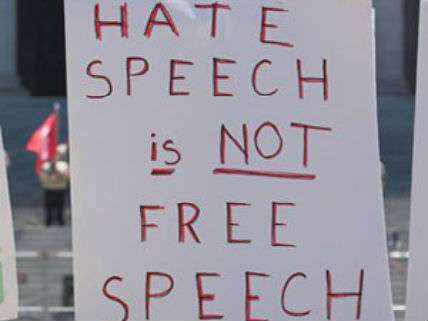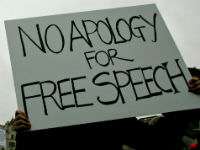Hate Speech Is Free Speech
"No one has the right to a world in which he is never despised."

If people are only free to say things that are unobjectionable to anyone, then they are not free to speak. The editorial board of the New York Times misses this vital point with an editorial today headlined, Free Speech vs. Hate Speech. Versus? As my colleague Robby Soave so well pointed out yesterday, there is no clause in the First Amendment that forbids the speaking of hateful words.
The Times editors write:
There is no question that images ridiculing religion, however offensive they may be to believers, qualify as protected free speech in the United States and most Western democracies. There is also no question that however offensive the images, they do not justify murder, and that it is incumbent on leaders of all religious faiths to make this clear to their followers.
But it is equally clear that the Muhammad Art Exhibit and Contest in Garland, Tex., was not really about free speech. It was an exercise in bigotry and hatred posing as a blow for freedom.
Yes, the organizers may well harbor hatred against Islam and Muslims in their hearts. Nevertheless, expressing such hatred is not just "posing as a blow for freedom," it is the exercise, however distressing, of freedom of speech.

Let's hop into the WABAC Machine to the late 1970s when our highest courts ruled that Nazis calling for the death of Jews is protected speech. In the 1977 case, the National Socialist Party of America vs. the Village of Skokie the U.S. Supreme Court properly ruled that the hateful Nazis had the free speech right to rally in a town where one in six residents were Holocaust survivors. Further, on First Amendment grounds, the Illinois Supreme Court overruled a lower court injunction that forbade…
…"[m]arching, walking or parading in the uniform of the National Socialist Party of America; [m]arching, walking or parading or otherwise displaying the swastika on or off their person; [d]istributing pamphlets or displaying any materials which incite or promote hatred against persons of Jewish faith or ancestry or hatred against persons of any faith or ancestry, race or religion."
Overruling that injunction was the right constitutional decision. In fact, the Times editorial board recognized it as such its editorial, Nazis, Skokie, and the A.C.L.U. which observed:
Opponents of the march argue that for a group displaying swastikas to stage a parade through such a town [with thousands of concentration camp survivors] constitutes a provocative act that goes beyond the right to freedom of speech guaranteed by the First Amendment.
The Civil Liberties Union disagrees, holding to a principle that has guided it for many years. Its executive director, Aryeh Neier, himself a refugee from Nazi Germany asks: "Did the Wobblies have a right to speak in company towns? Did Jehovah's Witnesses or birth control advocates have a right to pass out leaflets in Catholic neighborhoods? Did Norman Thomas have a right to speak in Frank Hague's Jersey City? Did Paul Robeson have a right to sing a concert in Peekskill, New York? Did Martin Luther King Jr. have a right to march in Selma, Alabama, or in Cicero, Illiinois? To all these questions, the A.C.L.U.'s answer is 'Yes.'"
Any confrontation in Skokie would be painful, as the disciples of murderers flaunt their hated symbols in the faces of people who survived the gas ovens. But on this issue, the A.C.L.U. has no choice. As Mr. Neier explains, if his organization is not faithful to the principle that free speech must be demanded for all, then it does not deserve the words "civil liberties" in its name.
The Times' Skokie editorial concluded:
As long as the Nazis do nothing illegal, they are entitled to the protection of the law. The argument that they will provoke violence simply by appearing on the streets of Skokie only emphasizes the obligation of the police to keep the peace - and gives an opportunity to the people of Skokie to demonstrate their respect for the law.
The happy truth is that Americans have become much more accepting of all kinds of racial, ethnic, religious, and sexual diversity. As a consequence, much hateful speech has disappeared from public discourse. Not because it is being suppressed by government monitors, but because defenders of minority views have vigorously exercised their right to free speech to counter hateful expression and encourage growing tolerance.
In my article, The Human Right to Offend, in which I review Jyllands-Posten Flemming Rose's terrific book, The Tyranny of Silence: How One Cartoon Ignited a Global Debate on the Future of Free Speech, I note:
The European Court of Human Rights has defined hate speech as "all form of expressions which spread, incite, promote, or justify hatred based on intolerance (including religious intolerance)." This completely turns the concept of tolerance on its head.
As Rose correctly argues, tolerance properly understood is the ability to accept speech one dislikes. "When we focus on non-discrimination and equality, and aim to empower the aggrieved, tolerance is no longer about the ability to tolerate things we don't like," he explains. "It becomes the ability to keep quiet and refrain from saying things that others may dislike." Calls to ban offensive speech sacrifices diversity of expression in the name of respecting diversity of culture. "If we accept the idea that people have a right not to be offended, we will end up with a tyranny of silence, for almost any speech may be deemed offensive," declares Rose.
Insult fundamentalists justify their efforts to restrict speech with the catchphrase, "Freedom of speech is not the same as the freedom to offend." In fact, there is no freedom of speech if people cannot offend those who would deny women equal rights, persecute homosexuals, and commit violence against people who do not share their faith. "The idea that if you say something that might be construed as offensive, you somehow restrict the liberty of others is nonsense," argues Rose. He is entirely right.
Finally, in my article, "No one has the right to a world in which he is never despised," I quote United Nations representative for the International Humanist and Ethical Union, Austin Dacey, and argue:
We must never reward violence. "We can understand the practice of violent retaliation against sacrilege as analogous to the violence employed by terrorists in pursuit of a political goal, or by kidnappers and extortionists in pursuit of personal gain," argues Dacey. In such situations, government officials properly adopt the "No Compliance Principle" – they do not give into the demands of the terrorists and kidnappers. Doing so will simply encourage others to engage in terrorism and kidnapping later. Similarly, refusing to comply now with the demands by violent Islamists to shut down free speech will prevent even more harm in the future. "By adopting a presumption of refusing to comply, and being seen to refuse to comply, we are doing what we can to uphold the rule of law and to contribute to a culture of open public discourse, in which no lawful expressive acts are prevented by threats of violence," explains Dacey.
Reverence for free speech ultimately protects the free exercise of religion. If a believer cannot speak in defense of his faith, then he has no real freedom of religion. That is why an attack on free speech is a greater blasphemy than is an insult to the divine.
So as much as it distresses me and the editors of the New York Times, there is no "versus" - hate speech is free speech.
See also, my editor Matt Welch's wonderful take-down the pusillanimous insult fundamentalists at PEN who refused to honor the memory of the Charlie Hebdo editors who were murdered by Islamic extremists for exercising free speech.
